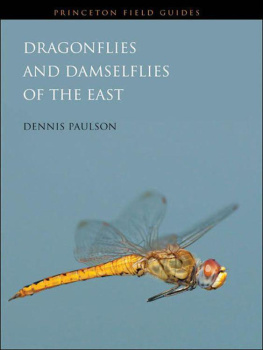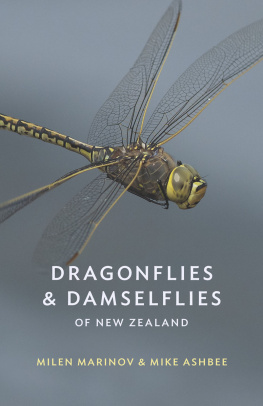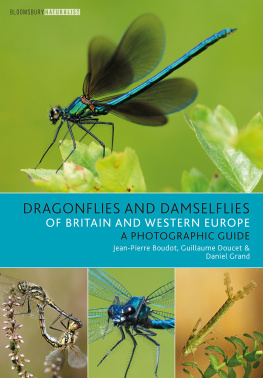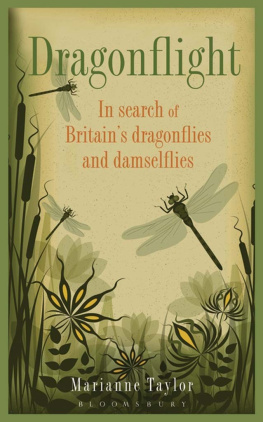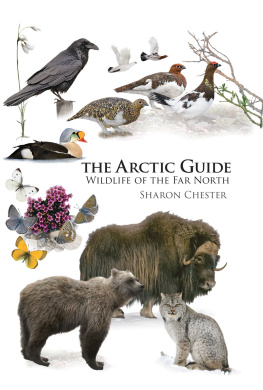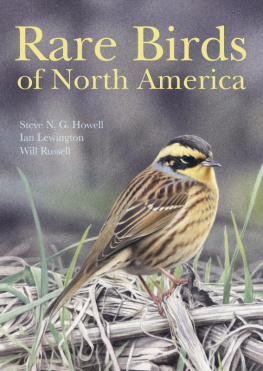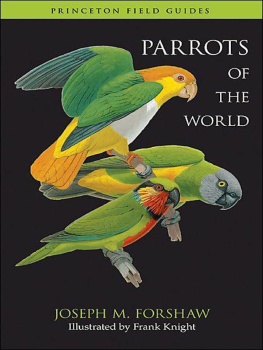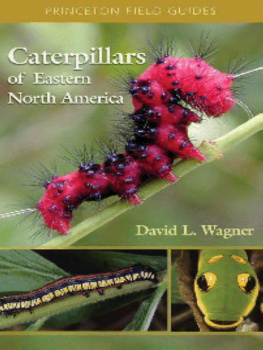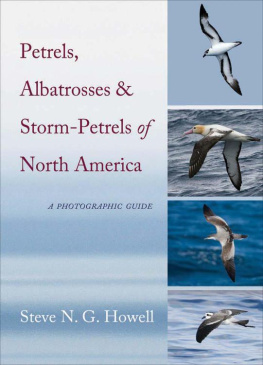Dragonflies and Damselflies of the East
Princeton Field Guides
Rooted in field experience and scientific study, Princetons guides to animals and plants are the authority for professional scientists and amateur naturalists alike. Princeton Field Guides present this information in a compact format carefully designed for easy use in the field. The guides illustrate every species in color and provide detailed information on identification, distribution, and biology.
Albatrosses, Petrels, and Shearwaters of the World, by Derek Onley and Paul Scofield
Birds of Australia, Eighth Edition, by Ken Simpson and Nicolas Day
Birds of Borneo: Brunei, Sabah, Sarawak, and Kalimantan, by Susan Myers
Birds of Chile, by Alvaro Jaramillo
Birds of the Dominican Republic and Haiti, by Steven Latta, Christopher Rimmer, Allan Keith, James Wiley, Herbert Raffaele, Kent McFarland, and Eladio Fernandez
Birds of East Africa: Kenya, Tanzania, Uganda, Rwanda, and Burundi, by Terry Stevenson and John Fanshawe
Birds of Europe, Second Edition, by Lars Svensson, Dan Zetterstrm, and Killian Mullarney
Birds of India, Pakistan, Nepal, Bangladesh, Bhutan, Sri Lanka, and the Maldives, by Richard Grimmett, Carol Inskipp, and Tim Inskipp
Birds of Kenya and Northern Tanzania: Field Guide Edition, by Dale A. Zimmerman, Donald A. Turner, and David J. Pearson
Birds of the Middle East, by R. F. Porter, S. Christensen, and P. Schiermacker-Hansen
Birds of Nepal, by Richard Grimmett, Carol Inskipp, and Tim Inskipp
Birds of Northern India, by Richard Grimmett and Tim Inskipp
Birds of Peru, by Thomas S. Schulenberg, Douglas F. Stotz, Daniel F. Lane, John P. ONeill, and Theodore A. Parker III
Birds of the Seychelles, by Adrian Skerrett and Ian Bullock
Birds of Southeast Asia, by Craig Robson
Birds of Southern Africa, by Ian Sinclair, Phil Hockey, and Warwick Tarboton
Birds of Thailand, by Craig Robson
Birds of the West Indies, by Herbert Raffaele, James Wiley, Orlando Garrido, Allan Keith, and Janis Raffaele
Birds of Western Africa, by Nik Borrow and Ron Demey
Caterpillars of Eastern North America: A Guide to Identification and Natural History, by David L. Wagner
Coral Reef Fishes, by Ewald Lieske and Robert Meyers
Dragonflies and Damselflies of the East, by Dennis Paulson
Dragonflies and Damselflies of the West, by Dennis Paulson
Mammals of Europe, by David W. Macdonald and Priscilla Barrett
Mammals of North America, Second Edition, by Roland W. Kays and Don E. Wilson
Minerals of the World, by Ole Johnsen
Nests, Eggs, and Nestlings of North American Birds, Second Edition, by Paul J. Baicich and Colin J. O. Harrison
Palms of Southern Asia, by Andrew Henderson
Parrots of the World, by Joseph M. Forshaw
The Princeton Field Guide to Dinosaurs, by Gregory S. Paul
Raptors of the World, by James Ferguson-Lees and David A. Christie
Seeds of Amazonian Plants, by Fernando Cornejo and John Janovec
Sharks of the World, by Leonard Compagno, Marc Dando, and Sarah Fowler
Stars and Planets: The Most Complete Guide to the Stars, Planets, Galaxies, and the Solar System, Fully Revised and Expanded Edition, by Ian Ridpath and Wil Tirion
Trees of Panama and Costa Rica, by Richard Condit, Rolando Prez, and Nefertaris Daguerre
Whales, Dolphins, and Other Marine Mammals of the World, by Hadoram Shirihai and Brett Jarrett
Dragonflies and Damselflies of the East
Dennis Paulson


Copyright 2011 by Princeton University Press
Published by Princeton University Press, 41 William Street, Princeton, New Jersey 08540
In the United Kingdom: Princeton University Press, 6 Oxford Street,
Woodstock, Oxfordshire OX20 1TW
press.princeton.edu
Jacket photograph: Pantala flavescens male Greg Lasley
All Rights Reserved
Library of Congress Cataloging-in-Publication Data
Paulson, Dennis R.
Dragonflies and damselflies of the East / Dennis Paulson.
p. cm.
Includes bibliographical references and index.
ISBN 978-0-691-12282-3 (hardback : alk. paper) ISBN 978-0-691-12283-0 (pbk. : alk. paper) 1. DragonfliesEast (U.S.)Identification. 2. DragonfliesCanada, EasternIdentification. I. Title.
QL520.2.A1P378 2011
595.733dc22
2011002779
British Library Cataloging-in-Publication Data is available
This book has been composed in Myriad Pro
Printed on acid-free paper.
Printed in the United States of America
10 9 8 7 6 5 4 3 2 1
Contents
Preface
The great recent interest in dragonflies has resulted in the publication of many good books dealing with them. There are now good technical manuals dealing with the entire North American fauna, and regional guides to damselflies, dragonflies, or both are appearing every year. Nevertheless, there are still no comprehensive field guides to all the Odonata of North America, and this book and a companion volume for western North America (Dragonflies and Damselflies of the West, Princeton, 2009) represent an attempt to fill that gap.
These books have two primary goals. The first is to make it possible to identify any of the 461 species of dragonflies and damselflies now known to occur in the United States and Canada. The second is to present material about their natural history that will prompt greater interest in their lifestyles. These insects are just as special as another group of well-loved insects, the butterflies, and there is no reason they cannot become as well known. We constantly alter the natural world, with both obvious and not-so-obvious effects, and we can hope that an increased knowledge of dragonflies will help us understand this world better, in particular the ecology and condition of our wetlands.
Global warming is bringing tropical species across our borders, and they are mixing with the ones already present. Natural wetlands are being filled and artificial ones created, and the forests that shelter many dragonflies are being cut down in some areas and regrown in others. Dragonflies are indicators of these changes if we understand them well enough. This is an exciting time in the study of the order Odonata, with so much amateur interest in the group and a concordant increase in our knowledge. Because of this, I hope these books will not only add to the enjoyment of all who choose to learn something about these fascinating animals but also add even more to what we already know about them.
I learned much about North American odonates when taken in the field or being accompanied by John Abbott, David Arbour, Richard Bailowitz, Jim Bangma, Allen Barlow, Giff Beaton, Bob Behrstock, Mike Blust, Sheryl Chacon, Duncan Cuyler, Jerrell Daigle, Doug Danforth, Marion Dobbs, Nick Donnelly, Bob DuBois, Sid Dunkle, Berlin Heck, Chris Hill, Bill Hull, Jim Johnson, Steve and Mary Jane Krotzer, Ed Lam, Greg Lasley, Charles Mills, Bryan Pfeiffer, Martin Reid, Martha Reinhardt, Larry Rosche, Jennifer Ryan, Judy Semroc, Gayle and Jeanell Strickland, Ken Tennessen, Mike Thomas, Sandy Upson, Michael Veit, Tom Young, and Bill Zimmerman. Messrs Beaton, Behrstock, Daigle, Danforth, Dobbs, Dunkle, Lasley, Reid, and Upson were especially appreciated repeated guides and companions. In addition, many of the other active field workers in North America have given me information about distribution, flight seasons, field identification, variation, habitat, and behavior of eastern Odonata. They include Maria Aliberti, Rob Alvo, John Belshe, Ethan Bright, Sharon Brown, Paul Brunelle, Burton Cebulski, Ken Childs, Glenn Corbiere, Dave Czaplak, John and Sue Gregoire, Greg Hanisek, George Harp, Kevin Hemeon, Tom Howard, Eric Isley, Ann Johnson, Colin Jones, Ellis Laudermilk, Jeremy Martin, David Moskowitz, Jeff Pippen, Herschel Raney, Mike Reese, Tom Schultz, Fred Sibley, Bill Smith, June Tveekrem, Tim Vogt, Erin White, and Hal White, and I hope I have not forgotten any of the others who belong on this list. Some of this information has come from the many online discussion groups that allow us all to communicate so freely about odonates.
Next page
